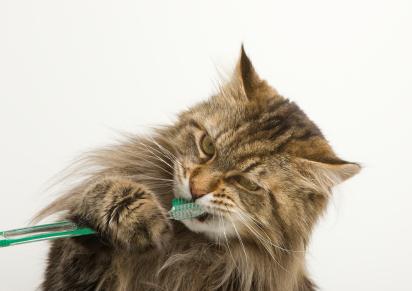Feb 15 2016
Feline Dental Care | Winslow Animal Hospital Dog & Cat
Home » Feline Dental Care | Winslow Animal Hospital Dog & Cat
Dental Health Awareness
February is dental awareness month at our hospital. Look for these symptoms of dental disease:
-
Pawing at the Mouth
-
Bleeding from the Mouth or Gums
-
Tartar on the Teeth, Red Gums
-
Bad Breath
-
Trouble Eating and Facial Swelling
Home Dental Care
Lets not forget that cats also suffer from dental disease and can also benefit from dental cleanings! It is thought that dental care for cats is one of the most overlooked areas in a small animal practice. Cats typically won’t let their owners brush their teeth at home. There are additives that can be place into their water, but brushing is still the number one way to keep their teeth clean. If your kitty is one of the many cats that won’t allow you to brush at home, then it is more important than ever to make sure they have a yearly checkup to not only check their overall health but their oral health in particular.
Cavities in Cats
Felines suffer from the same dental problems that dogs do and then some. From tooth resorption, to cancer. In cats we commonly see tooth resorption. A resorptive lesion is also known as a cavity. They can cause pain and discomfort for our cats. However, most cats will not show their discomfort until it becomes unbearable. Symptoms of cavities are as follows:
-
excessive salivation
-
difficulty eating
-
bleeding from the mouth
Since cats don’t show their discomfort right away, it is important that a veterinarian does a thorough oral exam. Especially for cats over the age of three, since the percentage of cats over the age of three with the condition is more than 50%. Taking care of the oral health of your cat can prolong their life! This is why it is so important to get your furry friend to the vet on a yearly basis and to pay attention to their dental health!
LifeLearn Admin | Pet Health, Tips, What's New at Winslow Animal Hospital!

